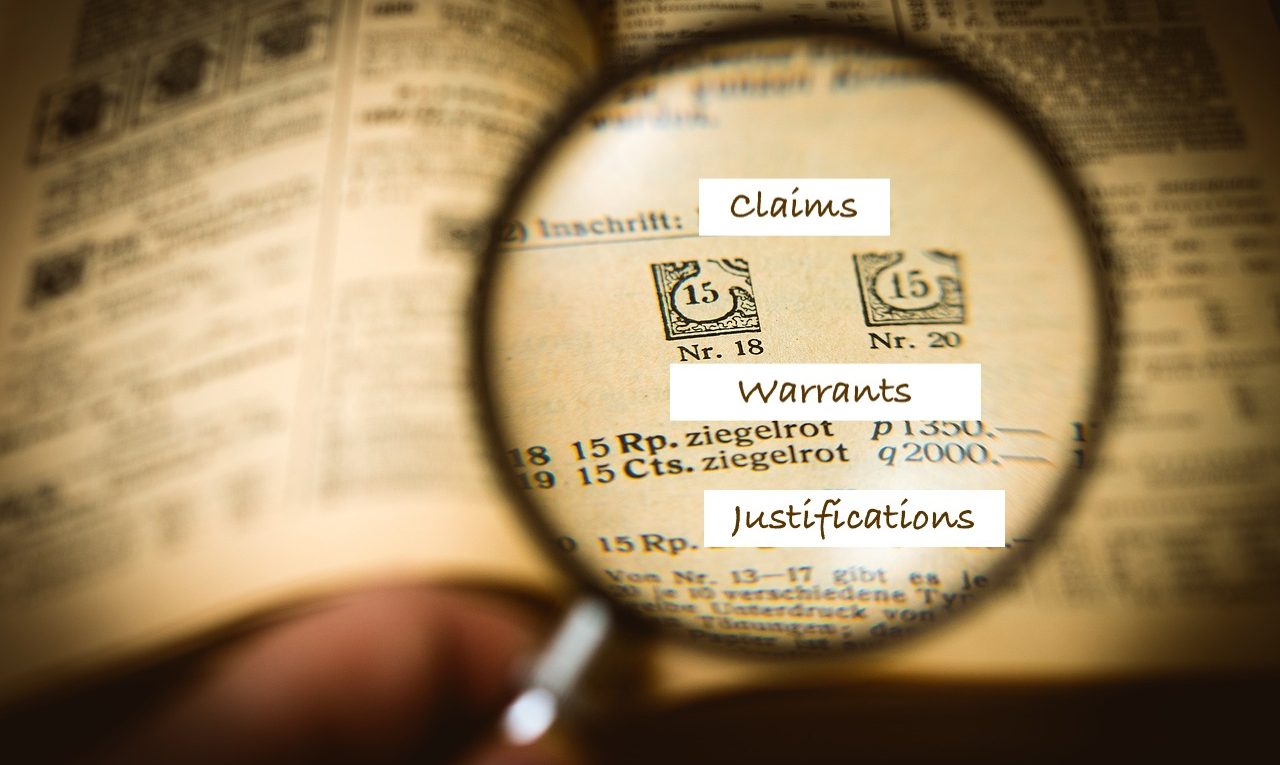Claims, Warrants, and Justifications
This response comes from several readings I’ve done this past week to examine the reason I’m doing this research, how I will justify my research decisions, how I claim to know what I know, and how I will elaborate on the warrants for my research.
Let’s start with claims. According to Hart (1998) almost anything can be argued, facts can be verified, and interpretations can be disputed. When I write a literature review, when I present interpretations I need to distinguish my personal preferences, judgements and inferences from my opinions or opinions of others. This internal and external debate can utilize analogies, metaphors, models, illustrations, and scenarios to strengthen my argument – within my own writing or when comparing/contrasting to the works of others. Hart (1998) elaborates on
- claims of fact – proven true or false, verifiable using evidence from authoritative sources
- claims of value – cannot be proven, based on judgements of worth, measured using qualifying standards
- claims of policy – normative standards of what should be done, comparative, idealized statements
When looking at my research, I need to be aware of where and when I make these claims based on what can or has been proven. This applies not only to my own writing, but the writing upon which I build my claims, ensuring I critically examine what is framed from an idealized statement of what should be happening, or when research conducted by others cannot be proven to have value.
Warrants in research outline the ways our research supports the claims we are making. They provide justification for our beliefs, feelings and actions. Warrants connect to the “original rationale for the study, the data and analysis and the claims we make at the end” (Thomson, 2015). Warrants are evident in the research design, how the research is conducted, in the logic of the argument, and in the awareness of the limitations of the research. For example, as outlined by Thomson (2015), “in ethnography the evidence of longterm involvement in the field of study is germane to credibility”. This is of importance to my research as I consider the warrants I need to explicitly include in my writing.
Justifications are a way to stand outside of your own research and logically analyze why you have done what you have done, to help a reader understand the process of the research (Carter & Little, 2007). We not only need to justify why the research we are conducting is worthy of investigation, but we need to defend and explain why we make specific decisions at each step of the research process. The justifications for doing the research can be based on a gap in the current state of the field, a next-step approach, or on a what-if approach (Thomson, 2019). These approaches in justifying research are outlined and examples provided by Thomson (2019). I’m partial to the next step approach since it does not paint the field as lacking, rather, it’s considered as an open space with work not yet done. The research is justified by fitting into the next logical step to be done. These usually include words like ‘to date….’ and ‘the next step is to ….’, so I’ll ‘add to the body of work’ with ‘A step, not THE step’ that comes next (Thomson, 2019). The justification comes, not from a deficit position, but as someone positioned within the field who aims to make a positive impact and add to the contributions that have gone before (Thomson, 2019). With the research I am hoping to accomplish, the justification will not only need to be made in the rationale for the study, in the process of conducting the study, and in the reasoning for the findings and limitations of the study, but I will also logically argue for the alternative dissertation format in the presentation of the study. Adding one additional layer of justification will be part of the research proposal, the literature review, and the final dissertation, in all its alternative formatting glory.
While each of these elements – claims, warrants and justifications – are critical throughout the research process and product, it’s important to step outside the research frequently enough to ensure that each are considered and connected to the work being done.
References
Carter, S. M., & Little, M. (2007). Justifying knowledge, justifying method, taking action: Epistemologies, methodologies, and methods in qualitative research. Qualitative Health Research, 17(10), 1316–1328. https://doi.org/10.1177/1049732307306927
Hart, C. (1998). Doing a literature review: Releasing the social science imaginiation. Thousand Oaks: Sage Publications.
Thomson, P. (2015, September 15). What is a ‘research warrant’? #knowhow. [weblog]. Retrieved October 18, 2019 from https://patthomson.net/2015/08/07/what-is-a-research-warrant-knowhow/
Thomson, P. (2019, March 11). Addressing ‘the gap’ in the field. [weblog]. Retrieved October 18, 2019 from https://patthomson.net/2019/03/11/addressing-the-gap-in-the-field/
Image attribution: Image by Arek Socha from Pixabay
